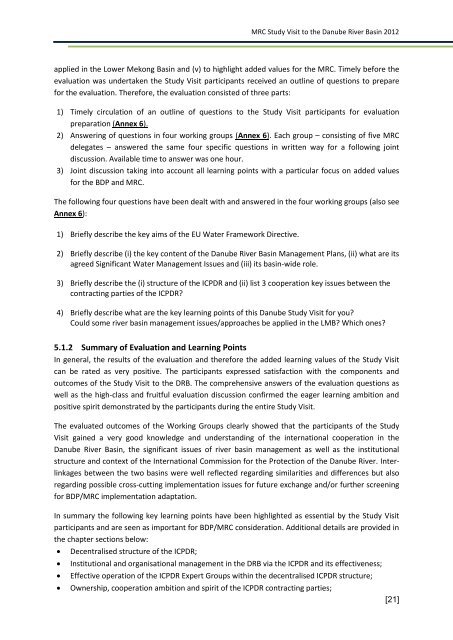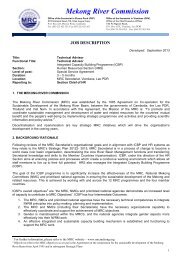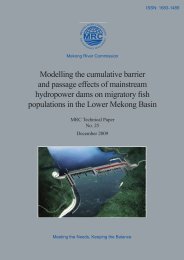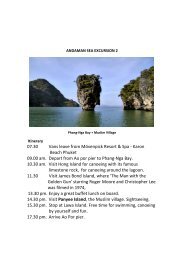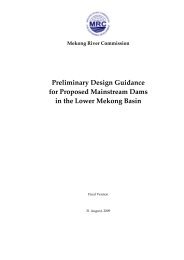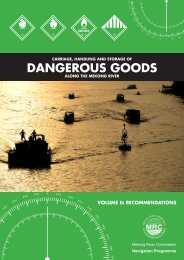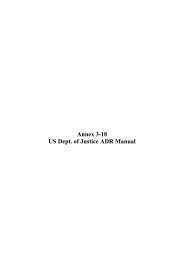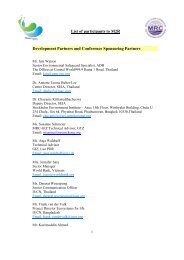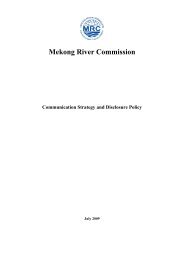evaluation of the study visit - Mekong River Commission
evaluation of the study visit - Mekong River Commission
evaluation of the study visit - Mekong River Commission
You also want an ePaper? Increase the reach of your titles
YUMPU automatically turns print PDFs into web optimized ePapers that Google loves.
MRC Study Visit to <strong>the</strong> Danube <strong>River</strong> Basin 2012<br />
applied in <strong>the</strong> Lower <strong>Mekong</strong> Basin and (v) to highlight added values for <strong>the</strong> MRC. Timely before <strong>the</strong><br />
<strong>evaluation</strong> was undertaken <strong>the</strong> Study Visit participants received an outline <strong>of</strong> questions to prepare<br />
for <strong>the</strong> <strong>evaluation</strong>. Therefore, <strong>the</strong> <strong>evaluation</strong> consisted <strong>of</strong> three parts:<br />
1) Timely circulation <strong>of</strong> an outline <strong>of</strong> questions to <strong>the</strong> Study Visit participants for <strong>evaluation</strong><br />
preparation (Annex 6).<br />
2) Answering <strong>of</strong> questions in four working groups (Annex 6). Each group – consisting <strong>of</strong> five MRC<br />
delegates – answered <strong>the</strong> same four specific questions in written way for a following joint<br />
discussion. Available time to answer was one hour.<br />
3) Joint discussion taking into account all learning points with a particular focus on added values<br />
for <strong>the</strong> BDP and MRC.<br />
The following four questions have been dealt with and answered in <strong>the</strong> four working groups (also see<br />
Annex 6):<br />
1) Briefly describe <strong>the</strong> key aims <strong>of</strong> <strong>the</strong> EU Water Framework Directive.<br />
2) Briefly describe (i) <strong>the</strong> key content <strong>of</strong> <strong>the</strong> Danube <strong>River</strong> Basin Management Plans, (ii) what are its<br />
agreed Significant Water Management Issues and (iii) its basin-wide role.<br />
3) Briefly describe <strong>the</strong> (i) structure <strong>of</strong> <strong>the</strong> ICPDR and (ii) list 3 cooperation key issues between <strong>the</strong><br />
contracting parties <strong>of</strong> <strong>the</strong> ICPDR?<br />
4) Briefly describe what are <strong>the</strong> key learning points <strong>of</strong> this Danube Study Visit for you?<br />
Could some river basin management issues/approaches be applied in <strong>the</strong> LMB? Which ones?<br />
5.1.2 Summary <strong>of</strong> Evaluation and Learning Points<br />
In general, <strong>the</strong> results <strong>of</strong> <strong>the</strong> <strong>evaluation</strong> and <strong>the</strong>refore <strong>the</strong> added learning values <strong>of</strong> <strong>the</strong> Study Visit<br />
can be rated as very positive. The participants expressed satisfaction with <strong>the</strong> components and<br />
outcomes <strong>of</strong> <strong>the</strong> Study Visit to <strong>the</strong> DRB. The comprehensive answers <strong>of</strong> <strong>the</strong> <strong>evaluation</strong> questions as<br />
well as <strong>the</strong> high-class and fruitful <strong>evaluation</strong> discussion confirmed <strong>the</strong> eager learning ambition and<br />
positive spirit demonstrated by <strong>the</strong> participants during <strong>the</strong> entire Study Visit.<br />
The evaluated outcomes <strong>of</strong> <strong>the</strong> Working Groups clearly showed that <strong>the</strong> participants <strong>of</strong> <strong>the</strong> Study<br />
Visit gained a very good knowledge and understanding <strong>of</strong> <strong>the</strong> international cooperation in <strong>the</strong><br />
Danube <strong>River</strong> Basin, <strong>the</strong> significant issues <strong>of</strong> river basin management as well as <strong>the</strong> institutional<br />
structure and context <strong>of</strong> <strong>the</strong> International <strong>Commission</strong> for <strong>the</strong> Protection <strong>of</strong> <strong>the</strong> Danube <strong>River</strong>. Interlinkages<br />
between <strong>the</strong> two basins were well reflected regarding similarities and differences but also<br />
regarding possible cross-cutting implementation issues for future exchange and/or fur<strong>the</strong>r screening<br />
for BDP/MRC implementation adaptation.<br />
In summary <strong>the</strong> following key learning points have been highlighted as essential by <strong>the</strong> Study Visit<br />
participants and are seen as important for BDP/MRC consideration. Additional details are provided in<br />
<strong>the</strong> chapter sections below:<br />
� Decentralised structure <strong>of</strong> <strong>the</strong> ICPDR;<br />
� Institutional and organisational management in <strong>the</strong> DRB via <strong>the</strong> ICPDR and its effectiveness;<br />
� Effective operation <strong>of</strong> <strong>the</strong> ICPDR Expert Groups within <strong>the</strong> decentralised ICPDR structure;<br />
� Ownership, cooperation ambition and spirit <strong>of</strong> <strong>the</strong> ICPDR contracting parties;<br />
[21]


